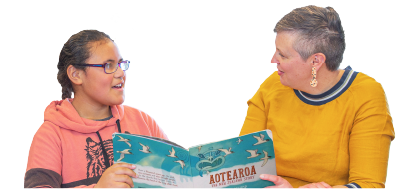Keeping the language alive at home
Show video transcript
Title slide: Keeping the language alive at home
Teresia Hewitt, Teacher Assistant, Parent, Kingsford Primary School, South Auckland
Exterior of Kingsford Primary
My rule at home with my three children – you're not allowed to speak English at home. You speak a language for the sake of your grandparents,
Teresia Hewitt, Teacher Assistant, Parent, Kingsford Primary School, South Auckland, facing camera
… and I was right. Because my Mum came, and all she wanted… “What are they talking about?” And I said… that’s the only thing I stop you from speaking English at home. And now because... my three children are fluent Samoan. So, my mum’s been talking to them because they want to join in the communication. But, the kids are limited with the language if we don't encourage them and do something about it.
Sene Kelisianom, Parent, Matiti Akoga Kamata (ECE), Wellington, facing camera
Culture for me is really important and language is one of the core fundamental aspects of an identity for a child growing up, certainly for me.
Children and teachers singing
It makes sense to bring my child here, or the grandchild that I have now so that she continues to be exposed to the language and the culture. You know English is easy to pick up as you grow older…
Sene Kelisianom, Parent, Matiti Akoga Kamata (ECE), Wellington, facing camera
… but it'll be difficult for her to learn, to learn the Tokelauan language. So it's important for me because now that I don't have my parents for her to pick the language from at home it's really important for her to be in an environment where they encourage children to speak their language, the language from their mother tongue.
Tangitangi Vave, Parent Komiti, Onepoto Primary School, Auckland, facing camera
My education has supported and helped me keep my language alive by reading more of my scriptures in Tongan, just trying to share with my kids. And at home, I speak mostly in Tongan so because when they come to school they speak in English. So those are one of the ways that I try to keep it alive.
Images of Classroom artifacts
Sene Kelisianom, Parent, Matiti Akoga Kamata (ECE), Wellington
One, our population is very small. So if back in the islands there's only less than two thousand people there that ...
Sene Kelisianom, Parent, Matiti Akoga Kamata (ECE), Wellington, facing camera
… nurtured and kept our culture and our language. Whereas in New Zealand, although the number of the population is quite high, many of them, I think more than 60 percent are born in New Zealand and they grow up in a very nuclear kind of environment, where they don't have the luxury or the benefits or that advantage of having grandparents living in the household that will allow them to learn the language. So I think it's... and so a lot of Tokelauen – New Zealand born Tokelauens – don't speak the language, which is sad but that's just how it is. So I think having early childhood education like Matiti is one of those one area that will help Tokelau to grow the language and maintain it in the way that you know we don't lose it in New Zealand.
This video explains the ways that Pacific families keep their languages alive at home. The video emphasises the inter-relationship between language and cultural identity, and the importance of protecting Pacific languages in Aotearoa. The early learning service, Matiti Tokelau Akoga Kamata, is an example of how a group of New Zealand born Tokelauans are growing and maintaining their language.
Reflections for individual teachers:
As you watch this video think of your role as a teacher working within a Pacific context.
- Some of your Pacific learners will be strong speakers of their first language because it is spoken and nurtured in their homes. How can you draw on the expertise of your learners and their families to bring Pacific languages to life in your classroom?
- Some of your Pacific learners won’t have knowledge of their first languages. Are there people or resources in your community that you can connect with to help bring their languages and cultures into your classroom curriculum?
Reflections for staff or departments:
If you watch this video as a staff member or member of a department team, think about effective leadership practices in Pacific cultures.
- Find out what groups or initiatives that support and develop Pacific languages and cultures are in your community. Consider ways that you can connect and build relationships with these groups so that you may draw on their expertise.
- How do you reflect the importance of Pacific languages and cultures in your charter, strategic plans, and school or centre curriculum?
- What short, medium, and long term goals can you set for your team to keep Pacific languages alive in your learning setting?



